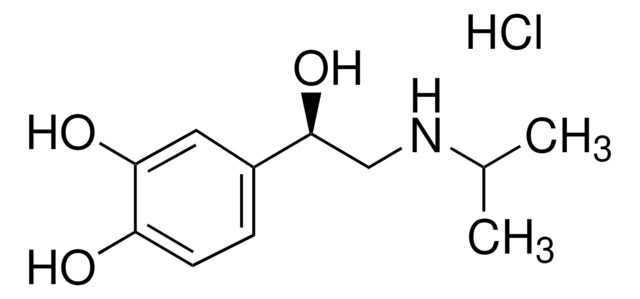P0884
(±)-Propranolol hydrochloride
≥99% (TLC), powder, β-adrenoceptor antagonist
Synonyme(s) :
(±)-1-Isopropylamino-3-(1-naphthyloxy)-2-propanol hydrochloride, DL-Propranolol hydrochloride
About This Item
Produits recommandés
product name
(±)-Propranolol hydrochloride, ≥99% (TLC), powder
Niveau de qualité
Pureté
≥99% (TLC)
Forme
powder
Couleur
white
Solubilité
ethanol: 10 mg/mL
DMSO: <14.5 mg/mL
H2O: 50 mg/mL
45% (w/v) aq 2-hydroxypropyl-β-cyclodextrin: 8.0 mg/mL
Auteur
AstraZeneca
Température de stockage
2-8°C
Chaîne SMILES
Cl.CC(C)NCC(O)COc1cccc2ccccc12
InChI
1S/C16H21NO2.ClH/c1-12(2)17-10-14(18)11-19-16-9-5-7-13-6-3-4-8-15(13)16;/h3-9,12,14,17-18H,10-11H2,1-2H3;1H
Clé InChI
ZMRUPTIKESYGQW-UHFFFAOYSA-N
Informations sur le gène
human ... ADRB1(153) , ADRB2(154) , ADRB3(155) , HTR1A(3350) , HTR1B(3351) , HTR1D(3352) , HTR1E(3354) , HTR1F(3355) , HTR2A(3356) , HTR2B(3357) , HTR2C(3358)
Vous recherchez des produits similaires ? Visite Guide de comparaison des produits
Description générale
Application
- to determine whether autonomic nervous system mediated the promotive effect on skin microcirculation in rat
- as a non-selective β- receptor blocker to reduce the arrhythmogenic events
- to study its effect on oxygen-induced retinopathy in mice
Actions biochimiques/physiologiques
Caractéristiques et avantages
Attention
Mention d'avertissement
Warning
Mentions de danger
Conseils de prudence
Classification des risques
Acute Tox. 4 Oral
Code de la classe de stockage
11 - Combustible Solids
Classe de danger pour l'eau (WGK)
WGK 3
Point d'éclair (°F)
Not applicable
Point d'éclair (°C)
Not applicable
Équipement de protection individuelle
dust mask type N95 (US), Eyeshields, Faceshields, Gloves
Certificats d'analyse (COA)
Recherchez un Certificats d'analyse (COA) en saisissant le numéro de lot du produit. Les numéros de lot figurent sur l'étiquette du produit après les mots "Lot" ou "Batch".
Déjà en possession de ce produit ?
Retrouvez la documentation relative aux produits que vous avez récemment achetés dans la Bibliothèque de documents.
Les clients ont également consulté
Articles
DISCOVER Bioactive Small Molecules for Neuroscience
DISCOVER Bioactive Small Molecules for Neuroscience
DISCOVER Bioactive Small Molecules for Neuroscience
DISCOVER Bioactive Small Molecules for Neuroscience
Chromatograms
application for SFCapplication for HPLCapplication for HPLCNotre équipe de scientifiques dispose d'une expérience dans tous les secteurs de la recherche, notamment en sciences de la vie, science des matériaux, synthèse chimique, chromatographie, analyse et dans de nombreux autres domaines..
Contacter notre Service technique











